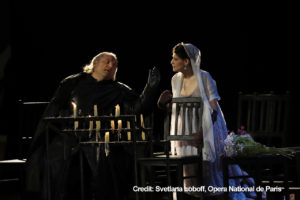
Opera National De Paris 2018-19 Review: Tosca
Jonas Kaufmann Goes Missing, But Anja Harteros Brings The Superstar Power
By Polina LyapustinaThis review covers two performances of “Tosca” at Opera de Paris — on 16th and 19th of May 2019.
Jonas Kaufmann canceled his first three performances of Tosca in Paris.
The audience was shocked. “Kaufmann cancels again!” “We were waiting for it for the whole season!” “We bought tickets in October!” “We were traveling to Paris just to see him!”
The audience was in a panic and sadly, it seemed that they had forgotten what the title of the opera they were going to see – “Tosca.”
Strong, passionate, controversial. Tosca — as a character and as a musical piece — is outstanding. And in our pro-feminist times I wonder, why should we pay so much attention to losing a tenor?
Passion with Style
Both an opera and the original play were a facile melodrama mixing love, desire, and politics with some ideas of liberation in the background. It wasn’t taken with consistent enthusiasm. Some took it as a great verismo masterpiece, others called it “shabby little shocker.” But no one could ever argue about a musical value.
I remember how I was fascinated by the music when I heard it for the first time. Through-composed, this opera mixed characters into the plot, one by one, making the story and emotions deeper with every bar. Puccini used Wagnerian style leitmotifs to identify characters, objects, and ideas, melting them into a seamless whole.
Leading Tosca is an art. If some critics find Wagner the hardest to perform, I find Puccini the easiest to ruin. Conducting Puccini requires complex vision, mastery, and pure feelings.
Maestro Dan Ettinger gave a solid reading of the score. He seemed comfortable with high emotional pressure, with more massive chorus work, with both brightness and darkness, and in between. He was able to bring sensitivity into the scenes full of violence, and power into the desperate moments. And all those details of the multi-layered score were shadowed by the Ettinger masterfully.
A vigorous conductor drew well-formed and sensual playing from the orchestra, and the cast only bolstered his work.
Supervillain
If you bought your ticket to see an incomparable performance, there was Željko Lučić as Barone Scarpia. I can barely imagine anyone who had ever matched the role that much.
Sometimes I caught myself thinking that no one else would fit this set, as much as he did. Climbing the stairs, sitting in the chair, passing the door — Scarpia, in his perfectly black leather coat, seemed perfectly inscribed into the picture, as if it was a sketch of Pierre Audi and Christof Hetzer.
His movements, expressions, and gestures were perfect. Staying silent, he remained a power-holder in every scene. He was cruel, sinful, violent, and absolutely powerful. A perfect villain.
But there was also the voice of Željko Lučić behind this character, and this means an astonishing vocal performance. His dramatic baritone has the darkness of a bass but remains flexible and more powerful in the high range. “Tre sbirri una carrozza” at the end of the first act was far beyond belief. The volume of his voice pinned the audience to the mat and let them breathe just after the curtains. He was powerful and effortlessly overcame the choir. And he was accurate and his five-bar-long legatos were smooth and connected. Maestro Ettinger managed to shadow some darker tones of Lučić’s voice in the massive orchestration of this part.
Scarpia’s recitative “Ha piu forte sapore” was sinful and arrogant, but with a constant note of disappointment. His chemistry with Tosca was tangibly repulsive. And in the dialogues, he managed to keep absolutely calm and self-assuredness, never raising his voice to emphasize his strength.
Diva
Sometimes I think, that “Diva” is a weak word to describes Tosca. What really distinguishes her from others is her pure kindness, intelligence, and energy to love and sacrifice. She always remains herself: acting on stage, feeling jealous, being scared. And the ability to show this spiritual and mental background implies a deep, multifaceted and well-developed voice, which is actually very rare. But Anja Harteros definitely has it all. Her rich, warm timbre and a fine feel for the drama make her a perfect Tosca.
She lit up the church, once she appeared. She pulled us out of the political context and from the first notes reminded us that this is a love story. For me, she did amazing work in duets with Scarpia, because as it happens in real life, sometimes we spend more time with people we don’t like at all. And behind her impressive acting and a powerful voice, you could clearly see a long-lasting background of these relationships. That is why her decision to murder feels so natural and perceived, even if it comes from such an innocent person.
Harteros gave a strong performance of “Vissi d’arte” when Tosca sings of the two great driving forces in her life: love and music. A high passage after “Con man furtuva…” balanced between F4 and A5 was very smooth and intense. High notes are considered the most difficult in operatic singing, but “poco allargando con anima” in such passages is a greater challenge. And Anja Harteros effortlessly brought her amazing sound to the very last rows in the hall. She showed paradigmatic legatos — not just rich and smooth, but accumulating all the energy of despair, bringing the heroine to the explosion on the high B.
She was extremely convincing in the last scene when in less than an hour, she managed to show a character development worthy of a long life. She confessed and was forgiven, she fell in love and dreamed a happy life, she turned back to reality, got scared, dared to play, and she lost.
And because of Anja Harteros’ heartbreaking performance in the last scene, for the first time in my life, I believed that Tosca could live no more. Neither because of the murder nor the loss of her love. That was her, and just her game with life, which was as complex as Tosca herself, and these two forces collided in a moment. And the result could no longer be challenged.
Missing Tenor & 2 Very Different Replacements
So back to the elephant in the room. Cavaradossi is not the main part and actually the shortest out of three main characters. But it’s extremely important. And when I tried to explain to myself why Kaufmann was so desirable for this role (besides his charming smile), I drew some kind of acoustic formula of three singers, where Scarpia brought power and robust sound, Tosca was responsible for brightness, and Cavaradossi supposedly reflected depth. And the depth of his voice serves to reveal his main characteristics: fortitude, maturity, fidelity, and bravery.
Italian tenor Vittorio Grigolo was chosen to opening the run. He has a name and his fame is well-deserved. So the Opéra de Paris obviously decided that either name or fame is equal to required voice characteristics. But I’m pretty sure, now they know that it isn’t.
His Cavaradossi was unconvincing and weak and his acting was fussy. “Recondita armonia” lacked solemnity, but he overdid the vibrato. His voice was bright and way too light for this role. He got lost in dialogues, and sometimes I thought Anja Harteros had to reduce her voice alongside him.
“E lucevan le stelle” was heartbreaking, but not because of the interpretation. Grigolo struggled to follow the score and lacked the depth of sound. He also couldn’t manage legato. “O dolci mani…” presented a huge gap (both vocal and artistic) between Harteros and Grigolo. They looked like heroes of different stories, suddenly caught on the same stage. Neither voices nor movements or emotions on their faces couldn’t match.
Though some people took Grigolo’s performance favorably, it was a disappointment overall.
The second tenor to cover Kaufmann’s absence was Marcelo Puente, who was supposed to perform Cavaradossi in the last performances of this run.
Puente might be not that famous, but what he presented the right timbre and serious preparation for this role. I will not make a secret of the fact that after Grigolo my expectations were very low. But fortunately, they were not met.
The Argentine tenor brought a truly outstanding performance, both vocally and as an actor. He was stressed out in the beginning but managed to calm down soon and starting from the second part of “Recondita armonia,” he made no mistakes. His dialogues were lively, passionate and convincing. He made a perfect couple with the soprano and proved a loyal friend. He was complex and mature, as was his voice.
His “Vittoria! Vittoria!” was proud and cheerful. And once the time came for the main aria — he was ready to hit. “O dolci baci’s” legato was also a great moment full of confidence, sensitivity, tenderness, and strong shape. The transition to the higher range in the last third was precise and smooth. So he finished with the clear long D, though he over-acted a bit on the final notes, moving to tears in desperation.
The performance by Puente definitely proved that a big name is not something required for a difficult role. Marcelo Puente’s success was the result of a lot of strong work. And this work convinces me that even when Jonas Kaufmann had canceled two more performances at Bastille, the audience will receive an exceptional performance of greatly interpreted Puccini masterpiece.



